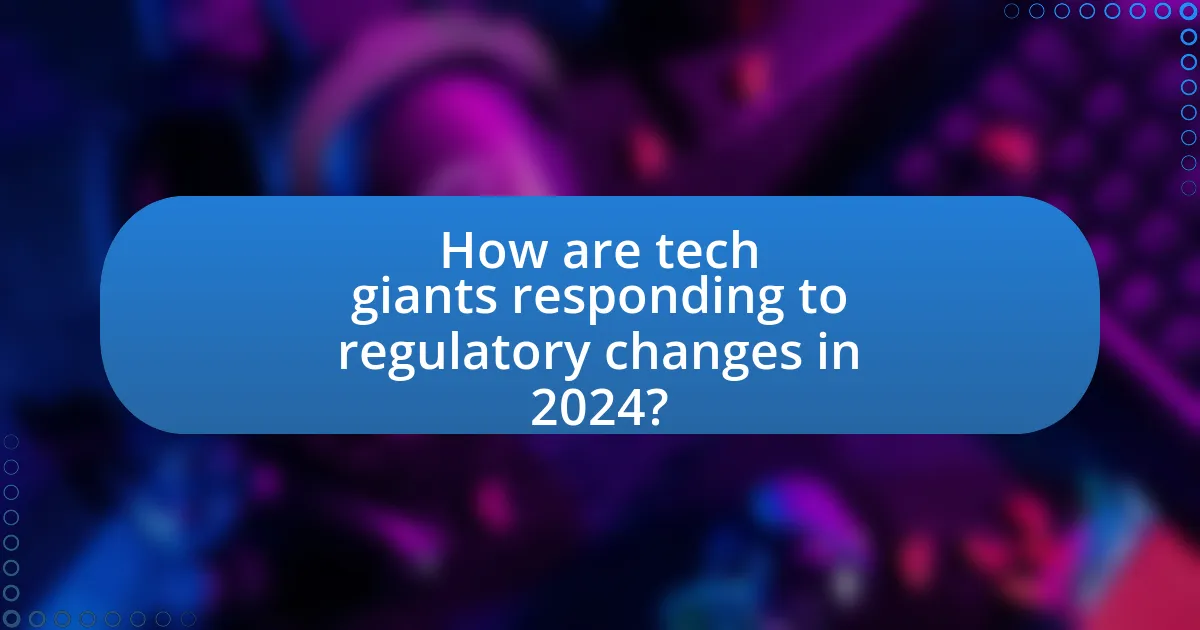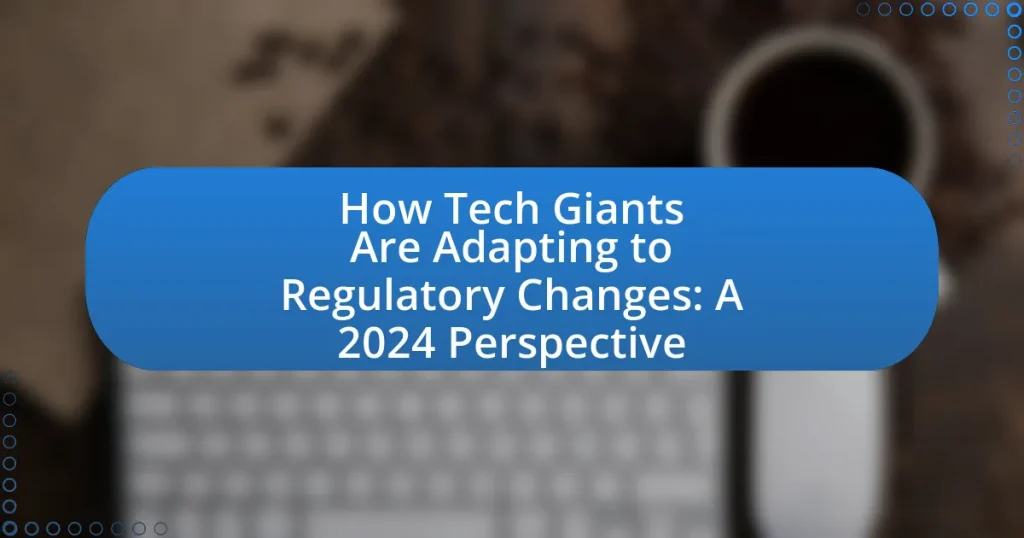The article focuses on how tech giants are adapting to regulatory changes in 2024, highlighting the proactive measures taken by companies like Google, Meta, and Amazon to enhance compliance and transparency. Key regulatory changes include the implementation of the Digital Markets Act and stricter data privacy regulations under the GDPR, which significantly impact sectors such as social media, e-commerce, and fintech. The article discusses the varying regulations across regions, the financial and reputational risks of non-compliance, and the strategies employed by tech firms to navigate these challenges, including investment in compliance technologies and collaboration with regulators. Additionally, it explores the implications of these adaptations for the future of the tech industry, consumer privacy, and data security.

How are tech giants responding to regulatory changes in 2024?
Tech giants are actively adapting to regulatory changes in 2024 by enhancing compliance measures and increasing transparency in their operations. Companies like Google and Meta have implemented new data privacy protocols to align with stricter regulations, such as the European Union’s Digital Services Act, which mandates greater accountability for online content. Additionally, Amazon has adjusted its marketplace policies to comply with new antitrust laws aimed at promoting fair competition. These adaptations are evidenced by the significant investments in legal and compliance teams, with reports indicating that tech firms are allocating billions to ensure adherence to evolving regulations.
What are the key regulatory changes impacting tech giants in 2024?
In 2024, key regulatory changes impacting tech giants include the implementation of the Digital Markets Act (DMA) in the European Union, which aims to prevent anti-competitive practices by large platforms, and the introduction of stricter data privacy regulations under the General Data Protection Regulation (GDPR) that enhance user consent requirements. The DMA specifically targets companies like Google and Apple, mandating them to allow third-party app stores and payment systems, thereby fostering competition. Additionally, the updated GDPR provisions impose heavier fines for non-compliance, which can reach up to 4% of a company’s global revenue, compelling tech giants to invest significantly in compliance measures. These regulatory frameworks reflect a global trend towards increased scrutiny and accountability for major technology firms.
How do these regulations vary across different regions?
Regulations governing tech giants vary significantly across different regions, primarily due to differing legal frameworks, cultural values, and economic priorities. For instance, the European Union enforces stringent data protection laws through the General Data Protection Regulation (GDPR), which mandates strict consent requirements and heavy penalties for non-compliance. In contrast, the United States adopts a more fragmented approach, with regulations varying by state, such as the California Consumer Privacy Act (CCPA), which emphasizes consumer rights but lacks the comprehensive nature of GDPR. Additionally, countries like China impose strict censorship and data localization laws, reflecting governmental control over information. These regional differences illustrate how tech giants must navigate a complex landscape of regulations tailored to local contexts, impacting their operational strategies and compliance efforts.
What specific sectors within tech are most affected?
The specific sectors within tech most affected by regulatory changes include social media, e-commerce, and fintech. Social media platforms face increased scrutiny over data privacy and content moderation, leading to stricter compliance requirements. E-commerce companies are impacted by regulations concerning consumer protection and taxation, which can alter operational practices. Fintech firms encounter challenges related to anti-money laundering and consumer protection laws, necessitating adjustments in their business models. These sectors are adapting to ensure compliance and mitigate risks associated with evolving regulations.
Why is it important for tech giants to adapt to these changes?
It is important for tech giants to adapt to regulatory changes to ensure compliance and maintain their market position. Adapting allows these companies to avoid legal penalties, which can be substantial; for instance, the European Union’s General Data Protection Regulation (GDPR) imposes fines up to 4% of annual global revenue for non-compliance. Furthermore, adapting to changes fosters consumer trust, as users increasingly prioritize data privacy and ethical practices. A 2023 survey by PwC indicated that 79% of consumers are concerned about how companies use their data, highlighting the necessity for tech giants to align with evolving expectations.
What risks do tech companies face if they fail to comply?
Tech companies face significant financial and reputational risks if they fail to comply with regulations. Non-compliance can lead to hefty fines; for instance, the General Data Protection Regulation (GDPR) imposes penalties of up to 4% of a company’s global revenue. Additionally, companies may suffer reputational damage, resulting in loss of consumer trust and market share. Historical examples include Facebook’s $5 billion fine by the Federal Trade Commission for privacy violations, which illustrates the severe financial repercussions of non-compliance. Furthermore, ongoing legal challenges can divert resources and focus away from innovation and growth, hindering a company’s competitive edge in the market.
How can compliance enhance a company’s reputation?
Compliance enhances a company’s reputation by demonstrating its commitment to ethical practices and regulatory standards. When a company adheres to laws and regulations, it builds trust with stakeholders, including customers, investors, and employees. For instance, a 2021 survey by PwC found that 78% of consumers are more likely to trust companies that prioritize compliance and transparency. This trust can lead to increased customer loyalty, improved brand image, and a competitive advantage in the market. Furthermore, companies that maintain high compliance standards are less likely to face legal issues, which can further protect and enhance their reputation.
What strategies are tech giants employing to navigate regulatory challenges?
Tech giants are employing a combination of proactive compliance measures, strategic lobbying, and investment in legal resources to navigate regulatory challenges. Companies like Google and Facebook have established dedicated teams to monitor and respond to regulatory developments, ensuring they remain compliant with evolving laws. Additionally, these firms engage in lobbying efforts to influence legislation in their favor, as seen in their substantial spending on lobbying activities, which reached over $100 million in 2022 alone. Furthermore, tech giants are investing in technology and partnerships that enhance transparency and data privacy, addressing regulatory concerns while maintaining user trust.
How are companies restructuring their operations in response?
Companies are restructuring their operations by implementing more agile frameworks and enhancing compliance mechanisms to adapt to regulatory changes. For instance, tech giants are increasingly decentralizing decision-making processes to respond swiftly to new regulations, which allows for localized compliance and faster adaptation. Additionally, many companies are investing in advanced data governance technologies to ensure adherence to privacy laws and regulations, reflecting a shift towards more transparent operational practices. This restructuring is evidenced by the fact that, according to a 2023 report from McKinsey, 70% of organizations have accelerated their digital transformation initiatives to align with evolving regulatory landscapes.
What role does technology play in ensuring compliance?
Technology plays a crucial role in ensuring compliance by automating processes, enhancing data accuracy, and facilitating real-time monitoring. Automated compliance management systems reduce human error and streamline the tracking of regulatory requirements, which is essential for organizations to meet legal standards. For instance, companies like IBM and Microsoft utilize advanced analytics and machine learning algorithms to analyze vast amounts of data, ensuring adherence to regulations such as GDPR and HIPAA. Furthermore, technology enables organizations to implement robust reporting tools that provide transparency and accountability, which are vital for regulatory audits. This integration of technology not only improves compliance efficiency but also mitigates risks associated with non-compliance, ultimately safeguarding organizations from potential legal penalties.
How are tech giants collaborating with regulators?
Tech giants are collaborating with regulators by engaging in dialogue and forming partnerships to address compliance and regulatory challenges. For instance, companies like Google and Facebook have established regular communication channels with government agencies to discuss data privacy and security measures. This collaboration often includes participating in public consultations and providing feedback on proposed regulations, which helps shape policies that govern technology use. Additionally, tech firms are investing in compliance technologies and practices to align with regulatory requirements, demonstrating their commitment to responsible governance.
What initiatives are being taken to foster dialogue between tech companies and regulators?
Tech companies and regulators are engaging in initiatives such as public consultations, collaborative working groups, and industry forums to foster dialogue. For instance, the European Union has implemented the Digital Services Act, which encourages tech companies to participate in discussions about compliance and best practices. Additionally, organizations like the Internet Association facilitate regular meetings between tech leaders and policymakers to address regulatory challenges and share insights. These initiatives aim to create a more transparent and cooperative environment, ensuring that regulations are informed by industry expertise and technological advancements.
How does collaboration influence regulatory outcomes?
Collaboration significantly influences regulatory outcomes by fostering dialogue between stakeholders, which can lead to more informed and effective regulations. When tech giants collaborate with regulators, they can share insights on technological capabilities and potential impacts, resulting in regulations that are both practical and conducive to innovation. For instance, the European Union’s Digital Services Act was shaped through consultations with major tech companies, allowing for a regulatory framework that addresses both user safety and business viability. This collaborative approach not only enhances compliance but also encourages a regulatory environment that adapts to rapid technological advancements.
What are the implications of these adaptations for the future of the tech industry?
The implications of these adaptations for the future of the tech industry include increased compliance costs, enhanced focus on data privacy, and potential shifts in market dynamics. As tech giants adjust to regulatory changes, they will likely invest significantly in compliance infrastructure, which could divert resources from innovation and product development. For instance, companies like Meta and Google have already allocated billions towards meeting new privacy regulations, indicating a trend that may continue across the industry. Additionally, the emphasis on data privacy may lead to the development of more secure technologies, fostering consumer trust but also increasing operational complexities. Furthermore, these adaptations could reshape competitive landscapes, as smaller firms may struggle to meet compliance standards, potentially leading to market consolidation. Overall, the tech industry’s future will be characterized by a balance between regulatory compliance and innovation, shaping its growth trajectory.
How might these changes shape innovation within tech companies?
Regulatory changes are likely to drive innovation within tech companies by necessitating compliance-focused solutions and fostering new business models. As companies adapt to stricter regulations, they may invest in advanced technologies such as artificial intelligence and blockchain to enhance transparency and security. For instance, the implementation of the General Data Protection Regulation (GDPR) in Europe prompted tech firms to innovate in data management and privacy tools, leading to the development of more robust data protection solutions. This trend indicates that regulatory pressures can catalyze technological advancements, ultimately reshaping the competitive landscape in the tech industry.
What long-term effects can we expect on consumer privacy and data security?
Long-term effects on consumer privacy and data security will likely include increased regulatory scrutiny and enhanced consumer protections. As governments implement stricter data protection laws, such as the General Data Protection Regulation (GDPR) in Europe, tech companies will be compelled to adopt more robust data security measures. This shift is evidenced by a 2022 report from the International Association of Privacy Professionals, which found that 70% of organizations planned to increase their privacy budgets in response to regulatory changes. Consequently, consumers can expect greater transparency regarding data usage and improved mechanisms for consent and data access, ultimately leading to a more secure digital environment.
What best practices can tech giants adopt to effectively manage regulatory changes?
Tech giants can effectively manage regulatory changes by implementing proactive compliance strategies. These strategies include establishing dedicated regulatory teams to monitor changes, engaging in continuous dialogue with regulators, and investing in compliance technology to streamline processes. For instance, companies like Google and Microsoft have created compliance frameworks that allow them to adapt quickly to new regulations, such as the General Data Protection Regulation (GDPR), which required significant adjustments in data handling practices. By adopting these best practices, tech giants can not only ensure compliance but also mitigate risks associated with regulatory penalties and enhance their reputation in the market.


